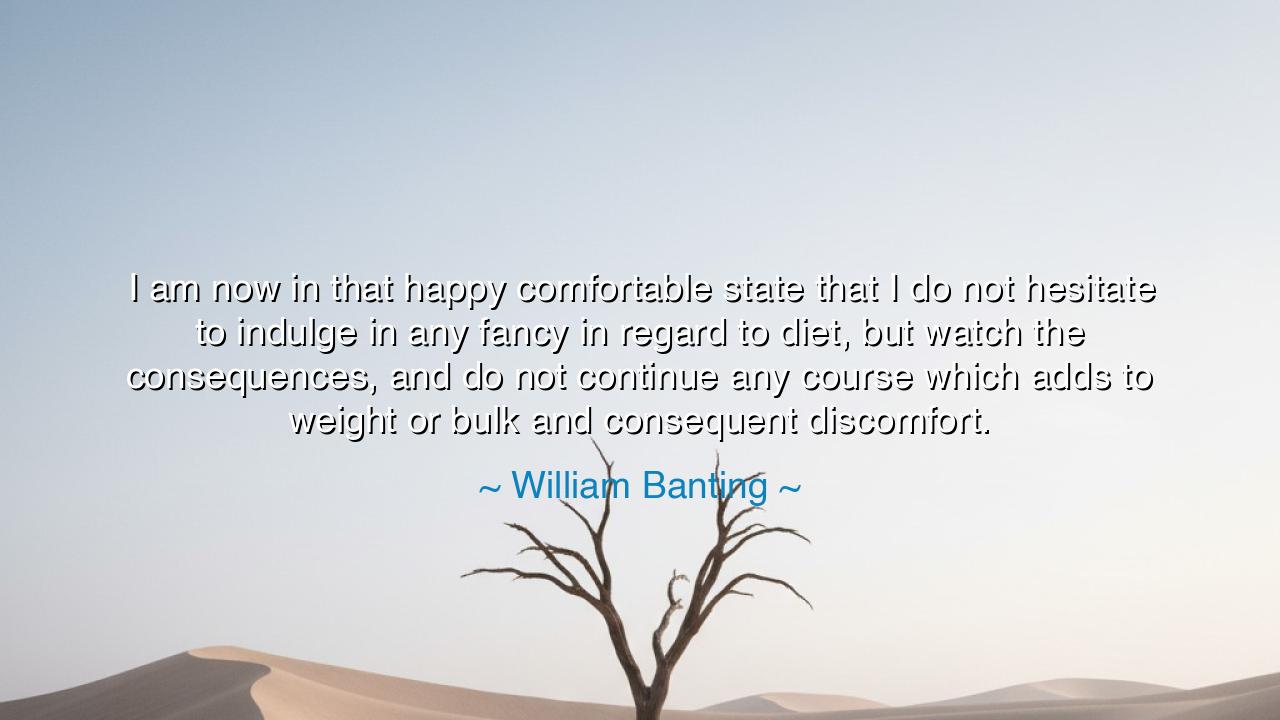
I am now in that happy comfortable state that I do not hesitate
I am now in that happy comfortable state that I do not hesitate to indulge in any fancy in regard to diet, but watch the consequences, and do not continue any course which adds to weight or bulk and consequent discomfort.






In the words of William Banting, “I am now in that happy comfortable state that I do not hesitate to indulge in any fancy in regard to diet, but watch the consequences, and do not continue any course which adds to weight or bulk and consequent discomfort.”
These words were not merely a reflection upon the body, but a revelation of the soul — a man’s conquest over excess, his triumph over the self that once bound him. Banting, in the 19th century, was among the first to speak openly of self-governance in diet, and though his concern was weight, his wisdom extends to every form of discipline and awareness that leads to inner harmony.
Once, Banting was a man beset by discomfort, the result of indulgence unchecked. His health waned beneath the burden of his own excesses; each indulgence became a chain, each pleasure a quiet sorrow. Yet in that darkness, he discovered a law older than any written by man — that freedom is born from restraint, and that pleasure becomes purer when the hand that holds it is steady. Thus, when he spoke of his “happy comfortable state,” it was not the happiness of gluttony, but the serenity of balance, a peace earned through trial and vigilance.
To indulge without surrendering — that was his art. He did not forbid himself from delight, nor did he turn ascetic and cold. He simply watched, as the ancient sages watched the stars, learning from the consequences of his actions. If something brought discomfort, he ceased; if it brought peace, he continued. Such is the wisdom of moderation, that golden path between famine and feast, denial and decay. In this, Banting’s teaching echoes the words of Aristotle, who taught that virtue lies not in abstinence, but in temperance — the steady hand that guides passion’s flame so it may warm, not burn.
Consider, for example, the story of Marcus Aurelius, the Roman emperor-philosopher, who amidst the splendor of empire, practiced simplicity in his habits. Surrounded by feasts and finery, he wrote in his Meditations: “When you have eaten, be content; and if your body grows weary, do not despise it, but remember that you are mortal.” Like Banting, Aurelius sought equilibrium between pleasure and prudence. He indulged the body only as one would care for a faithful steed — feeding it enough to serve, never enough to master.
What Banting learned, and what the wise have long taught, is that self-observation is the root of wisdom. One who watches himself, who listens to the subtle murmurings of the body and soul, cannot stray far from truth. The fool ignores consequence until it shouts; the wise man hears it whisper. To “watch the consequences” is to live with open eyes — to learn not through punishment, but through perception, and to correct one’s path before the cliffs draw near.
In our own age, where indulgence is abundant and appetite endless, Banting’s words rise like an ancient bell through the noise. They call us to mindfulness, not through denial, but through presence. To eat, to rest, to act — all with awareness. To ask, not “May I?” but “Will this bring peace or burden?” Such questions transform even simple acts into sacred practice. Thus, one may live richly yet wisely, finding comfort not in excess, but in balance.
The lesson, therefore, is this: freedom without observation becomes folly; pleasure without measure becomes pain. Let us, like Banting, embrace indulgence as a friend, not a master. Let us savor life’s offerings, yet keep the eyes of the soul ever open. Watch, learn, and adjust — for this is the art of the enduring spirit.
Practical wisdom for our time:
-
Observe yourself daily — note what brings comfort, and what burdens.
-
Moderate, not eliminate — let discipline be gentle but firm.
-
Reflect on consequence, not just desire. Ask what your actions yield in the long flow of days.
-
Cherish balance — it is the quiet throne of the contented heart.
Thus may each of us find, as Banting did, that “happy comfortable state” — not a fleeting pleasure, but the eternal ease of one who lives in harmony with himself.






AAdministratorAdministrator
Welcome, honored guests. Please leave a comment, we will respond soon